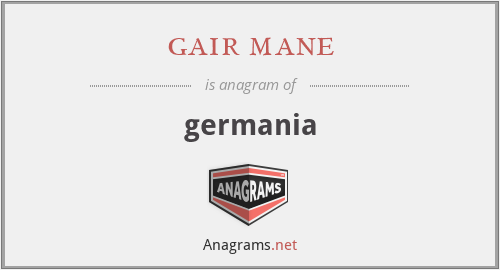What anagrams are available for germania?
This page is about an anagram for the word gair mane that can be used in word games, puzzles, trivia and other crossword based board games.
gair mane
Translation
Find a translation for gair mane in other languages:
Select another language:
- - Select -
- 简体中文 (Chinese - Simplified)
- 繁體中文 (Chinese - Traditional)
- Español (Spanish)
- Esperanto (Esperanto)
- 日本語 (Japanese)
- Português (Portuguese)
- Deutsch (German)
- العربية (Arabic)
- Français (French)
- Русский (Russian)
- ಕನ್ನಡ (Kannada)
- 한국어 (Korean)
- עברית (Hebrew)
- Gaeilge (Irish)
- Українська (Ukrainian)
- اردو (Urdu)
- Magyar (Hungarian)
- मानक हिन्दी (Hindi)
- Indonesia (Indonesian)
- Italiano (Italian)
- தமிழ் (Tamil)
- Türkçe (Turkish)
- తెలుగు (Telugu)
- ภาษาไทย (Thai)
- Tiếng Việt (Vietnamese)
- Čeština (Czech)
- Polski (Polish)
- Bahasa Indonesia (Indonesian)
- Românește (Romanian)
- Nederlands (Dutch)
- Ελληνικά (Greek)
- Latinum (Latin)
- Svenska (Swedish)
- Dansk (Danish)
- Suomi (Finnish)
- فارسی (Persian)
- ייִדיש (Yiddish)
- հայերեն (Armenian)
- Norsk (Norwegian)
- English (English)
Definition
What does germania mean?
- Germania
- Germania ( jər-MAY-nee-ə; Latin: [ɡɛrˈmaːni.a]), also called Magna Germania (English: Great Germania), Germania Libera (English: Free Germania), or Germanic Barbaricum to distinguish it from the Roman province of the same name, was a large historical region in north-central Europe during the Roman era, which was associated by Roman authors with the Germanic peoples. The region stretched roughly from the Middle and Lower Rhine in the west to the Vistula in the east. It also extended as far south as the Upper and Middle Danube and Pannonia, and to the known parts of Scandinavia in the north. Archaeologically, these peoples correspond roughly to the Roman Iron Age of those regions. While apparently dominated by Germanic peoples, Magna Germania was also inhabited by Celts. The Latin name Germania means "land of the Germani", but the etymology of the name Germani itself is uncertain. During the Gallic Wars of the 1st century BC, the Roman general Julius Caesar encountered peoples originating from beyond the Rhine. He referred to these people as "Germani" and their lands beyond the Rhine as "Germania". In subsequent years, the Roman emperor Augustus sought to expand across the Rhine towards the Elbe, but these efforts were hampered by the victory of Arminius at the Battle of the Teutoburg Forest in 9 AD. The prosperous Roman provinces of Germania Superior and Germania Inferior, sometimes collectively referred to as "Roman Germania", were subsequently established in northeast Roman Gaul, while territories east of the Rhine remained independent of Roman control. From the 3rd century AD, Germanic peoples moving out of Magna Germania began encroaching upon and occupying parts of Roman Germania. This contributed to the fall of the Western Roman Empire in the 5th century AD, after which territories of Roman Germania were captured and settled by migrating Germanic peoples. Large parts of Germania subsequently became part of the Frankish Empire and later East Francia. The name of Germany in English and many other languages is derived from the name Germania.
Embed
Citation
Use the citation below to add this anagram to your bibliography:
Style:MLAChicagoAPA
"gair mane." Anagrams.net. STANDS4 LLC, 2024. Web. 16 May 2024. <https://www.anagrams.net/term/5376706>.



Discuss this germania anagram with the community:
Report Comment
We're doing our best to make sure our content is useful, accurate and safe.
If by any chance you spot an inappropriate comment while navigating through our website please use this form to let us know, and we'll take care of it shortly.
Attachment
You need to be logged in to favorite.
Log In